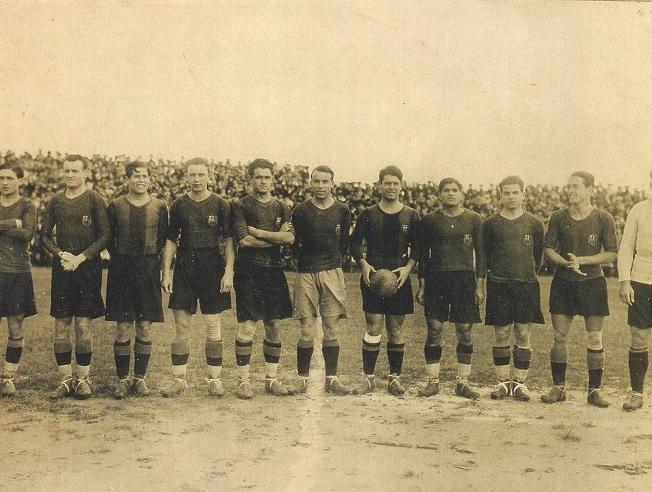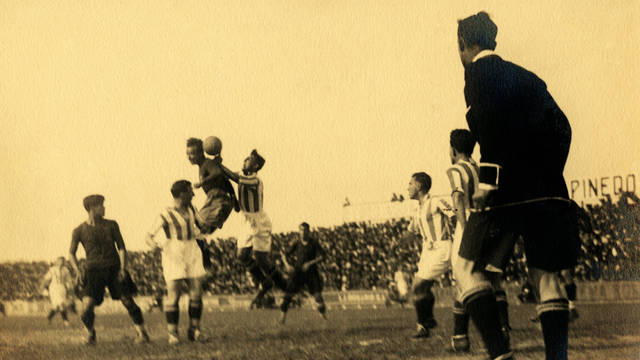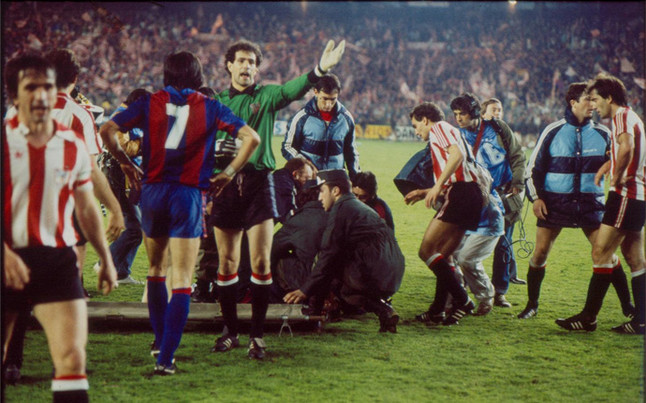Last update March 4, 2020 by Javier Argudo
It was known as the end of the thirty days, but actually were thirty-nine dates that elapsed between the corresponding meeting began to Cup final 1928 and the day on which the F.C. Barcelona He managed to win the title. The longest end of the story started a 20 May 1928, It was played in Santander, and large presence of fans of both teams, mostly donostiarras, proximity logical questions.
The soccer event was attended by personalities from the cultural moment, and poets Gabriel Celaya Y Rafael Alberti, Argentine singer Carlos Gardel or the great cultural patron of the time, Jacobo Fitz-James Stuart Hawk, Duke of Alba.
The Real society he agreed to it after removing -including the historic rout by 7 a 0 al Valencia – y el F.C. Barcelona He had done the same with the Deportivo Alavés. The year 1928 not only it became the longest final in the history of European football, but in one of the most controversial and caused quarrels between the interests of Real society Y Barcelona Soccer Club during years.
THE BATTLE OF SANTANDER
That first meeting was called by the referee vizcaíno (Real funny being one of the contenders) Pedro Vallana. Shortly after starting the first of the final three it occurred the first incident of the "Battle of Santander", a crash, according to the fortuitous donostiarra press and according to intended Catalan, front Cholín Alcorta with the goalkeeper Platko just this injured. The Hungarian goalkeeper suffers a tremendous head trauma causing him to lose consciousness and left bloodied and lying on the grass santanderino. Alarm injury to such an extent that suggests the worst, but it was a shock and six stitches on the forehead of Hungarian international. The holder goalkeeper could not, so, continue and Barca team striker tinerfeño, angel Arocha, not being allowed changes, I was forced to act as goalkeeper.
Shortly after, an input misplaced a defense donostiarra injures Samitier, who held on the lawn, lame, a bulky bandage, and barely touching the ball, although in one of his rare interventions, He achieved the goal that meant the momentary victory culé 1 a 0 shortly after the start of the second half. Tempers flare between the two teams and the violent actions verging succeed. Donostiarra fans protested a possible penalty on said Cholín in the final of the encounter, so the referee pointed and the game looked set to end with victory Barca, but one goal Mariscal six minutes to put score the equalizer somewhat, which would end result with ninety minutes of regulation, and it also would be altered in the corresponding extension.
However that did not exist penalty shootouts, in case of a tie after extra time, they proceeded to play another meeting two days later. It would be done, She dictated by the rules, at the same stage and with the same referee. The second thing did not happen, both clubs protested the federation's performance and this vizcaíno referee chose to replace the famed Pedro Escartín.
FIRST GUARDIA CIVIL altercations with
For the second of the end, contested at four in the afternoon of day 22 of May, Platko, fortunately recovered, resumed the goal of F.C. Barcelona. The atmosphere between the two clubs was more than heated and also affected the supporters. The crowd was donostiarra majority, supported almost unanimously by santanderinos who came to witness the second of the meetings. The environment, so, was not the most suitable for purely football and the game it was developed by some sports channels.
violent tickets succeeded by each other, the strong wind did not help that the game was extremely nice and weighed the physical, to the detriment of the quality of the game. the referee, with more authority than Vallana, I was forced to expel two players. Both left the pitch by violent entrances to rival: in the minute 70 He expelled the azulgrana Guzman and ten minutes later do the same with the donostiarra Cholín.
The meeting ended with the same result as the previously disputed: tie somewhat. The first was the work of donostiarra Greek in the minute 32 and tied, at 69, the Catalan Piera. After the meeting there was one of the first violent events in the history of Spanish football: a group of fans of Real went into the locker room the Catalan side to attack the players. There was an exchange of kicks, some punch and insults and were evicted from it by the Civil Guard coup truncheon.
CELEBRACIÓN EN LAS RAMBLAS… POR ERROR
In Barcelona, While, Many fans took to the streets to celebrate the victory blaugrana nonexistent. Las Ramblas filled with fans singing: "It aliro, it aliro, Barça are champions ". The reason was the error Radio Barcelona he had given the wrong news of the Barcelona victory 2 a 1.
The reality is that there had been a new tie and an extra problem arose: note new date, with the disadvantage that some of the players of both teams were international and were called to dispute Amsterdam Olympic Games. He remembers, so, postpone the third game when the Olympics are completed and the date fixed 29 June to contest the final would be the third meeting of this very long end. The scenario is the same: the Campos de Sport de El Sardinero, in Santander.
A LA TERCERA… VA LA VENCIDA
The third and final end was marked by the polemics of the two previous. The referee appointed to whistle it was the vizcaíno Pablo Saracho and violent situations between two teams produced identically to the front end. The referee sent off two players and, according to chronicles of the time, It should take a few more. Barca Carulla and txuri urdin Mariscal they went to the street after beating each other.
The Catalans was much higher from the outset, He scored his first goal -work Samitier– nada más comenzar el encuentro, in the minute 8, and rest was reached as to the final outcome of 3 a 1 in favor of the Catalans (with goals from Arocha Y Sastre for Barca and Zaldúa by the Royal). The arbitration was not easy, despite the superiority of the Catalan team, donostiarra fans and claimed two penalties in their favor, one, apparently, Clear, but the truth is that Barcelona won clearly and could have achieved some goal that prevented the excellent speeches goalkeeper txuri urdin, Jesus Izaguirre.

ALBERTI RAFAEL VS Gabriel Celaya
Thirty-nine days for the longest final and controversial history that came to be embodied in two poems of two great names of Spanish literature. Everyone watching from their partisan prism, logically. Cadiz poet, Barca avowed follower, Rafael Alberti he dedicated an ode to Platko and donostiarra writer Gabriel Celaya did the same, with another poem, complaining about the arbitration proceedings suffered by his team.
"No, nobody, no one, no one,
nobody forgets, Platko.
Not the end: your departure,
bear blond blood,
swoon flag on the shoulders of the field.
¡ Oh, Platko, Platko, Platko
you, so far from Hungary !
What sea have been able to not mourn ?
No one, nobody forgets,
no, no one, no one, no one"
(Alberti)
"And I also remember our triple defeat
in those games against Barcelona
that if we won, No thanks to Platko
but ten clear penalty that robbed.
blue and white camisoles flying
in the air, happy, as free birds,
assailed the goal defended furiously
and nothing could then all intelligence
and the deployment of donostiarras
then they fought the blind rage
and mud, and kicks, and an arbitrator bought. "
(Celaya)




